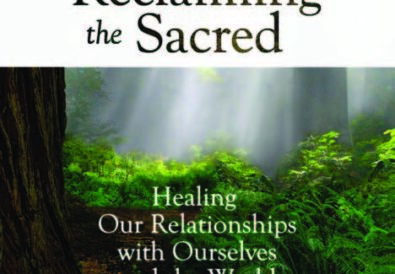Usually we think, I’m in charge of my life. I decide who I’ll be in a relationship with, where it’s going, how long it will last, when it’s over. On one level it seems as if we can choose to enter certain relationships and then choose when to let them go. Like buying a ticket to go on a train ride, we think that once we’re on the journey we can choose to get off at any stop we like.
But this isn’t necessarily so, especially in relationships. Even when things become difficult, we may find ourselves unable to leave, having to remain in that situation for a long while. Even when we don’t like the person they often keep reappearing in our lives again and again. We cannot escape them even if we want to.
We may be happy and hope the relationship lasts forever, and then, suddenly, it may end. Or a troubled relationship will go on and on, no matter how badly we want it to end.
Pillar of Love:
We Have a Divine Appointment to Meet and Be with Another.
Many become depressed when things don’t work out as they hoped and take this as personal failure. They think they weren’t good enough to make the relationship work. But it’s not that. No matter how we feel about it, we have a Divine Appointment to meet certain people, to interact with them for a certain length of time, and at a certain, definite point, to part.
Most do not realize that there are important reasons they have met a particular person and are interacting with them. They do not take time to discover the lessons and gifts the relationship is bringing to them. And they do not offer all that they have to give to that person, either. They may choose to withdraw or be resentful. Many declare themselves victims or martyrs in relationships. This is a dangerous way to think about things. It will only make the interaction more painful and prevent one from seeing what is truly needed.
The Stream of Karma
In Zen a Divine Appointment is called our stream of karma. Other traditions may call it destiny. In the Torah it is called Divine Providence, meaning that all of our lives are planned and guided by the hand of God. This does not mean that we are helpless or victims. Sometimes we’re very drawn to be in an activity or with a person; other times we want to get away. But despite our wishes and efforts, we have to be right where we are.
We Are Always In Charge of The Way We Respond
Although we may not be able to control or change the events that are happening, we are always in charge of our responses to them. We are in charge of the ways we act, react, the lessons we learn, how much we grow, how strong we become.
When the same painful relationship or situation keeps appearing in our lives, psychologists call it the Repetition Compulsion. This is where we unconsciously and compulsively repeat the same situation in our lives over and over, in an effort to make it right this time. This is also a wonderful description of the Wheel of Karma that keeps turning and draws to us exactly what we need.
Learn The Lesson Of The Relationship
Our patterns keep repeating until we have learned the lesson of the relationship, forgiven it, experienced what we have done to others, and change our behavior now. The relationship is giving us the opportunity to balance things out, pay our debt, start fresh.
For example, we may take and take from others. But what do we give in return? How are the scales balanced? Sooner or later we must receive in our lives exactly what we have given to others.
Turning Point: May This Relationship Be a Balancing
Rather than be angry or discontent, when in a difficult relationship say, “May this relationship be a balancing for me. May I learn from it and grow.” This infuses our relationships with meaning, order and benefit. Rather than lashing out and keeping the cycle going, we are becoming clear, loving and strong, and ending suffering.
For example, there is a teaching in Judaism that when you are insulted, if you do not reply, your errors and misdeeds, are wiped away. They are balanced. The important part here is not replying, not lashing back out again, not keeping the cycle going.
What’s Wrong? I Haven’t Been Insulted in Two Weeks
There’s a wonderful story of three Rabbis who took this teaching deeply to heart. They actually looked forward to being insulted, so they could set the slate clean. One day one of the rabbis looked downcast and another asked him why.
The Rabbi said, “I don’t think God loves me anymore.”
“What are you talking about?” the other Rabbi, asked, aghast.
“Well,” said the first Rabbi, “I haven’t been insulted in two weeks.”
Here the insult had turned into an act of love for the Rabbi, rather than a cause for rage.
Rather than be upset, when we learn how to respond with gratitude for every encounter, we can finally fulfill the reason we are meeting, and the relationship can become whole and complete. Then we can receive the gift the other is bringing to us, see the true reason we’ve met.
Turning Point: See All Relationships as Divine Encounters
Even in a very difficult relationship, this perspective will calm you down and turn things around. Rather than fight the person or situation, pause and ask why this situation is being brought to you. What is the lesson, what is the balancing needed?
Practice: With Whom Do You Have A Divine Appointment?
Take a few moments to view your relationships as divine encounters. Especially the ones you are having difficulty with. Instead of fighting and resenting it, here are some actions to reveal what’s truly needed to make it beneficial for all:
Ask yourself, what is needed in this situation to make the relationship complete and whole? Are there past debts that have come to be fulfilled?
ACTIONS TO TAKE
- Accept Things Just as They Are.
- Let Them Turn Out As They Do.
- Stop Fighting the Person.
- Say Yes. Give Up Resisting Them.
- See Them Through The Eyes of Love
Seeing Through The Eyes of Love balances everything.
And inevitably fills both you and the other with strength and joy.
Brenda Shoshanna, Ph.D. is an award winning author, speaker, psychologist and long term Zen practitioner. This article is from her new book The Unshakeable Road To Love (Value Centered Relationships, Relationships). (www.totalrelationshipsnow.com) topspeaker@yahoo.com. The book includes eternal principles from all the world’s scriptures, including Zen. These principles guide us in building our relationships upon a foundation, where happiness and well being are inevitable. And where upset, pain and conflict can dissolve on the spot. The book is filled with exercises and simple practices to use daily in your everyday life.
* Seeing Through The Eyes of Love will be offered online as a workshop soon. Let me know if you’re interested in attending *




















